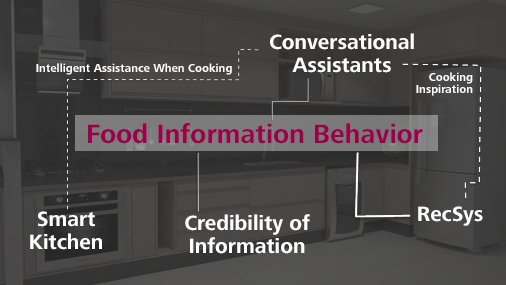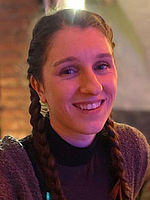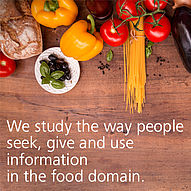
Food Information Behavior

Conversational Assistants
Information Needs in Natural Language Dialogues
Overview
As conversational search becomes more pervasive, it becomes increasingly important to understand the users' underlying needs when they converse with such systems in diverse contexts. The aim of this project is to improve information need detection. In the long term, this will help improving conversation between user and system, because the system gains a better understanding of what the user wants when it is able to detect the user’s information needs. For this purpose, we have chosen the food domain as area of interest.
Literature
Radlinski, F. & Craswell, N. (2017). A Theoretical Framework for Conversational Search. In Proceedings of the 2017 Conference on Conference Human Information Interaction and Retrieval (S. 117-126). New York: ACM.
Shiga, S., Joho, H., Blanco, R., Trippas, J. R., & Sanderson, M. (2017). Modelling Information Needs in Collaborative Search Conversations. In Proceedings of the 40th International ACM SIGIR Conference on Research and Development in Information Retrieval (S. 715-724). New York: ACM.
Trippas, J. R., Sanderson, M., Spina, D., & Cavedon, L. (2015). Results Presentation Methods for a Spoken Conversational Search System. In Proceedings of the First International Workshop on Novel Web Search Interfaces and Systems (S. 13–15). New York: ACM.
Trippas, J. (2016). Spoken conversational search: speech-only interactive information retrieval. In Human Information Interaction and Retrieval (S. 373–375). New York: ACM.
Trippas, J. R., Spina, D., Cavedon, L., & Sanderson, M. (2017). How Do People Interact in Conversational Speech-Only Search Tasks: A Preliminary Analysis. In Proceedings of the 2017 Conference on Conference Human Information Interaction and Retrieval (S. 325-328). New York: ACM.
Trippas, J. R., Spina, D., Cavedon, L., Joho, H., & Sanderson, M. (2018). Informing the Design of Spoken Conversational Search. In. Proceedings of 2018 Conference on Human Information Interaction & Retrieval (S. 32 – 41). New York: ACM.
Team
| (Information Science, UR) |
(Information Science, UR) |
Contact
Food Recommender Systems and Food Assistance Systems
FoodChoice
Modelling & Changing Online Food Choices through Recommenders
Studying how people upload and browse online recipes has recently become an active field of research. While there is a growing body of work investigating which types of food are consumed and how this relates to real-world health related issues, such as e.g. diabetes or obesity, little research focus has yet been devoted to understanding how people make their food choices online, how they are influenced by certain contextual factors, how this behavior can be modelled or how this behavior can be changed. With respect to the last problem, recommender systems - such as those used by online stores to suggest products customers might like- are often touted as part of the solution. However, very little literature exists describing to which extent food preferences can be changed or the different effects different algorithmic approaches can have. In response we initiated a cross-border research project FoodChoice, which aims to not only to provide a better understanding regarding how certain factors, such as temporality, user geography and social relations between users influence the food choices people make online, but to moreover investigate how this behavior can be modelled and changed through novel health-aware recommender algorithms.
Publications
coming soon
Funding & Collaboration
Team
|
(Information Science, UR) | (Information Science and Media Studies, |
|
(Information Science, UR) |
Contact
Computer-Aided Change of Nutrition Behavior
Overview

In this project, our group in cooperation with the Department of Psychosomatic Medicine of the University Hospital Regensburg investigates how and to what degree digital aids can support the behavior change of obese patients. In the project, participants of the OPTIFAST programe are equipped with a smart phone app that makes many tasks of an OPTIFAST participant much easier: book keeping of consumed food, looking up its nutritional values, searching for tasty meals under the constraints of the programe, learning about nutritional values of food.
The project also explores if gamification elements can further support behavior change. For this purpose, a board game is integrated in the smart phone app that teaches much about nutritional values and healthy food behavior in a playful way.
Literature
Schlankheitsmittel "Optifast" (Verbraucherzentrale.de)
OPTIFAST Programm 52 (Nestlé Health Science)
OPTIFAST52 (Universitätsklinikum Regensburg)
Bischoff SC, Damms-Machado A, Betz C, Herpertz S, Legenbauer T, Löw T, Wechsler JG, Bischoff G, Austel A, Ellrott T, Multicenter evaluation of an interdisciplinary 52-week weight loss program for obesity with regard to body weight, comorbidities and quality of life—a prospective study. Int J Obes (Lond). 2012 Apr;36(4):614-24. doi: 10.1038/ijo.2011.107
Zisterer T (2005) Entwicklung eines sozialpädagogischen Brettspiels zur Unterstützung bei der Gewichtsreduktion. Diplomarbeit an der FH Regensburg, Fachbereich Sozialwesen
Fenk S, Fischer M, Strack C, Schmitz G, Loew T, Lahmann C, Baessler A. Successful weight reduction improves left ventricular diastolic function and physical performance in severe obesity. Int Heart J. 2015;56(2):196-202. doi: 10.1536/ihj.14-261. Epub 2015 Feb 27. PubMed PMID: 25740581.
Lahmann C, Henrich G, Henningsen P, Baessler A, Fischer M, Loew T, Tritt K, Pieh C. The impact of personality traits on the success of a multimodal obesity treatment. Behav Med. 2011 Oct;37(4):119-24. doi:10.1080/08964289.2011.635169. PubMed PMID: 22168328.
Nickel MK, Loew TH, Bachler E. Change in mental symptoms in extreme obesity patients after gastric banding, Part II: Six-year follow up. Int J Psychiatry Med. 2007;37(1):69-79. PubMed PMID: 17645199.
Nickel C, Widermann C, Harms D, Leiberich PL, Tritt K, Kettler C, Lahmann C, Rother WK, Loew TH, Nickel MK. Patients with extreme obesity: change in mental symptoms three years after gastric banding. Int J Psychiatry Med. 2005;35(2):109-22. PubMed PMID: 16240969.
Funding & Collaboration
Team
|
(Information Science, UR) | (Psychosomatics, UKR) |
|
(Information Science, UR) | (Psychosomatics, UKR) |
| (Information Science, UR) | (Information Science, UR) |
Contact
WeightPal
Overview
The increasing rate of obesity in the German population calls for the development of new treatment options as a way to reduce costs on the public health care system and increase treatment success.
This project explores possibilities of automated empathetic conversation to support traditional obesity treatment. The constant availability of a conversational agent could solve problems related to weight loss as soon as they arise and help with impulse control. The non-judgemental nature of such a system as opposed to counsellors or peers has the potential to lower the user’s inhibitions and increase honesty in conversations about sensitive topics.
In the long term, such a conversational agent could be a valuable tool in the treatment and prevention of obesity.
Publications
Meyer, Selina, Elsweiler, David, Ludwig, Bernd (2020). Assessing the quality of weight loss information on the German language web, Movement and Nutrition in Health and Disease, Vol (4) 2020, DOI:10.5283/mnhd.26
Team
|
(Information Science, UR) |
(Information Science, UR) |
|
(Information Science, UR) |
Contact
Credibility of Information
Corroborate
Corroborate: Understanding and supporting the information credibility judgments people make online
How able are people to judge the credibility of information found on the web? How do people make these decisions? Are the decisions biased?
This project deals among other application areas with information behaviour regarding food and nutrition, e.g.:
- Is spinach a good source of iron?
- How much milk should I drink if I have osteoporosis?
- Is a vegan diet healthy?
Making credibility judgements in information environments, such as the web is challenging because, in contrast to traditional print and broadcast media, often no quality control mechanism exists. This places increased emphasis on user information literacy skills, including their ability to evaluate information critically. These are skills, which people, regardless of education level, tend to overestimate (Gross 2012). Moreover, recent IR research has emphasized that user actions while seeking information, as well as the perception of information found is biased in countless ways. Although credibility judgements for web pages and SERP snippets have been well studied, we still know relatively little about how such evaluations are made and how they may be affected by user biases. This project aims to broaden our understanding of how people judge credibility, how successful they are, and what determines this. We further aim to design systems to support the critical evaluation of information informed by the improved better understanding the processes and biases involved.
Publications
coming soon
Team
|
(Information Science, UR)
(Computer Science and Artificial Intelligence, Universidade de Santiago de Compostela) | (Research Group Geoinformation, TU Wien) |
Contact
- Fakultät für Sprach-, Literatur- und Kulturwissenschaften
- Institut für Information und Medien, Sprache und Kultur (I:IMSK)
















